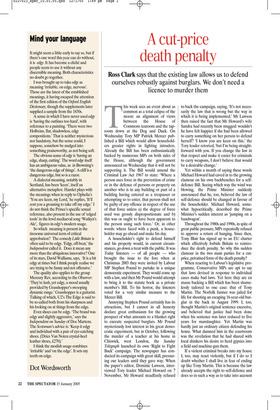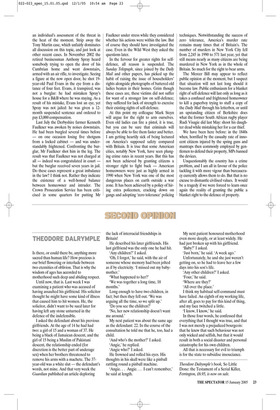A cut-price death penalty
Ross Clark says that the existing law allows us to defend ourselves robustly against burglars. We don’t need a licence to murder them This week sees an event about as common as a total eclipse of the moon: an alignment of views between the House of Commons tearoom and the taproom down at the Dog and Duck. On Wednesday Tory MP Patrick Mercer published a Bill which would allow householders greater rights in fighting intruders. Already the Bill has been enthusiastically backed by numerous MPs on both sides of the House, although the government announced on Wednesday that it will not be supporting it. The Bill would amend the Criminal Law Act 1967 to state: ‘Where a person uses force in the prevention of crime or in the defence of persons or property on another who is in any building or part of a building having entered as a trespasser or attempting so to enter, that person shall not be guilty of any offence in respect of the use of that force unless a) the degree of force used was grossly disproportionate and b) this was or ought to have been apparent to the person using such force.’ Or, in other words: where faced with a punk, a householder may go ahead and make his day.
A householder’s right to defend himself and his property would, in current circumstances, go down a treat with the public. It was Today listeners — of all people — who brought the issue to the fore when at Christmas 2003 they were invited by Labour MP Stephen Pound to partake in a unique democratic experiment. They would come up with a law, and then Mr Pound would attempt to bring it to the statute book as a private member’s Bill. To his horror, the listeners voted for a very similar measure to the Mercer Bill.
Annoying Stephen Pound certainly has its attractions, but I cannot in all honesty declare great enthusiasm for the growing prospect of what amounts to a blanket right to execute suspected burglars. Mr Pound mysteriously lost interest in his great democratic experiment, but in October, following the murder of a teacher at his home in Chiswick, west London, the Sunday Telegraph launched its own ‘Right to Fight Back’ campaign. The newspaper has conducted its campaign with great skill, pressuring our leaders until they gave way. When the paper’s editor, Dominic Lawson, interviewed Tory leader Michael Howard on 7 November, Mr Howard steadfastly refused to back the campaign, saying, ‘It’s not necessarily the law that is wrong but the way in which it is being implemented.’ Mr Lawson then raised the fact that Mr Howard’s wife Sandra had recently been mugged: wouldn’t he have felt happier if she had been allowed to carry something on her person to defend herself? ‘I know you are keen on this,’ the Tory leader retorted, ‘but I’m being straightforward with you. If you change the law in that respect and make it easier for criminals to carry weapons, I don’t believe that would be a desirable change.’ Yet within a month of saying these words Michael Howard had caved in to the growing clamour on his own backbenches for a selfdefence Bill. Seeing which way the wind was blowing, the Prime Minister suddenly announced that he, too, believed the law of self-defence should be changed in favour of the householder. Michael Howard, somewhat hypocritically, described the Prime Minister’s sudden interest as ‘jumping on a bandwagon’.
Throughout the 1980s and 1990s, in spite of great public pressure, MPs repeatedly refused to approve a return of hanging. Since then, Tony Blair has signed up to an EU charter which effectively forbids Britain to reintroduce the death penalty. So why this sudden clamour in the two main parties for a cutprice, privatised form of the death penalty?
When reacting to Labour’s legislative programme, Conservative MPs are apt to say that laws devised in response to individual cases make bad laws. Yet here they are en masse backing a Bill which has been shamelessly tailored to one case: that of Tony Martin. The Norfolk farmer was jailed for life for shooting an escaping 16-year-old burglar in the back in August 1999. I, too, thought Martin’s original sentence excessive, and believed that justice had been done when his sentence was later reduced to five years for manslaughter. Yet Martin was hardly just an ordinary citizen defending his home. What damned him in the courtroom was the revelation that he had shared with local drinkers his desire to herd gypsies into a field and machine-gun them.
If a violent criminal breaks into my house I, too, may react violently, but if I do so I doubt whether I shall live in fear of ending up like Tony Martin. This is because the law already accepts the right to self-defence and does so in such a way as to take into account an individual’s assessment of the threat in the heat of the moment. Strip away the Tony Martin case, which unfairly dominates all discussion on this topic, and just look at other recent cases. In November 2002 the retired businessman Anthony Spray heard somebody trying to open the door of his Cumbrian home and went downstairs, armed with an air rifle, to investigate. Seeing a figure at the now open door, he shot 19year-old Paul Evans in the eye from a distance of four feet. Evans, it transpired, was not a burglar: he had mistaken Spray’s house for a B&B where he was staying. As a result of his mistake, Evans lost an eye, yet Spray was not jailed: he was given a 12month suspended sentence and ordered to pay £3,000 compensation.
Last July the Derbyshire farmer Kenneth Faulkner was awoken by noises downstairs. He had been burgled several times before — on one occasion losing five shotguns from a locked cabinet — and was understandably frightened. Confronting the burglar, Mr Faulkner shot him in the leg. The result was that Faulkner was not charged at all — indeed was congratulated in court but the burglar received seven years in jail. Do these cases represent a great imbalance in the law? I think not. Rather they indicate the existence of a well-honed balance between homeowner and intruder. The Crown Prosecution Service has been criticised in some quarters for putting Mr Faulkner under stress while they considered whether his actions were within the law. But of course they should have investigated the case. Even in the Wild West they asked the questions later.
In the fervour for greater rights for selfdefence, all reason is suspended. The Sunday Telegraph, since joined by the Daily Mail and other papers, has picked up the habit of raising the issue of householders’ rights alongside photographs of battered old ladies beaten in their homes. Grim though these cases are, these victims did not suffer for want of a stronger law on self-defence; they suffered for lack of strength to exercise their existing rights of self-defence.
At this point my colleague Mark Steyn will argue for the right to arm ourselves. Even old ladies can fire a pistol, it is true, but you can be sure that criminals will always be able to fire them faster and better. I am getting heartily sick of being lectured on America’s supposed safety compared with Britain. It is true that some American cities, notably New York, have seen plunging crime rates in recent years. But this has not been achieved by granting citizens a stronger right to fight back — American homeowners were just as highly armed in 1990 when New York was one of the most dangerous places on earth outside a war zone. It has been achieved by a policy of hiring extra policemen, cracking down on gangs and adopting ‘zero tolerance’ policing techniques. Notwithstanding the success of zero tolerance, America’s murder rate remains many times that of Britain’s. The number of murders in New York City fell from 2,245 in 1990 to 571 last year, yet that still means nearly as many citizens are being murdered in New York as in the whole of Britain. So much for the right to bear arms.
The Mercer Bill may appear to reflect public opinion at the moment, but I suspect that situation will not last long should it become law. Public enthusiasm for a blanket right of self-defence will last only as long as it takes a confused and frightened homeowner to kill a paperboy trying to stuff a copy of the Daily Mail through his letterbox, or until an upstanding citizen of Berkshire does what the former South African rugby player Rudi Visagie did last May: shoot his daughter dead while mistaking her for a car thief.
We have been here before: in the 1840s when, horrified by the casualty rate of innocent citizens injured by the spring guns and mantraps then commonly employed by gentlemen to defend their property, MPs banned the devices.
Unquestionably the country has a crime problem, and I am all in favour of the police tackling it with more vigour than bureaucracy currently allows them to do. But that is no excuse to dismantle civilised values. It would be a tragedy if we were forced to learn once again the reality of granting the public a blanket right to the defence of property.






















































 Previous page
Previous page